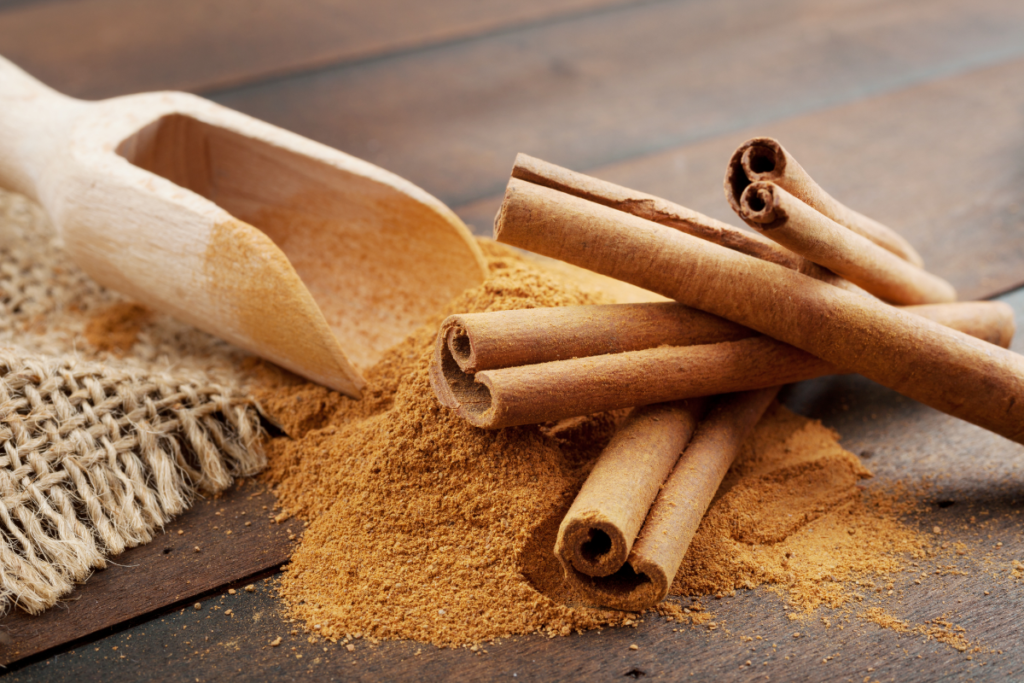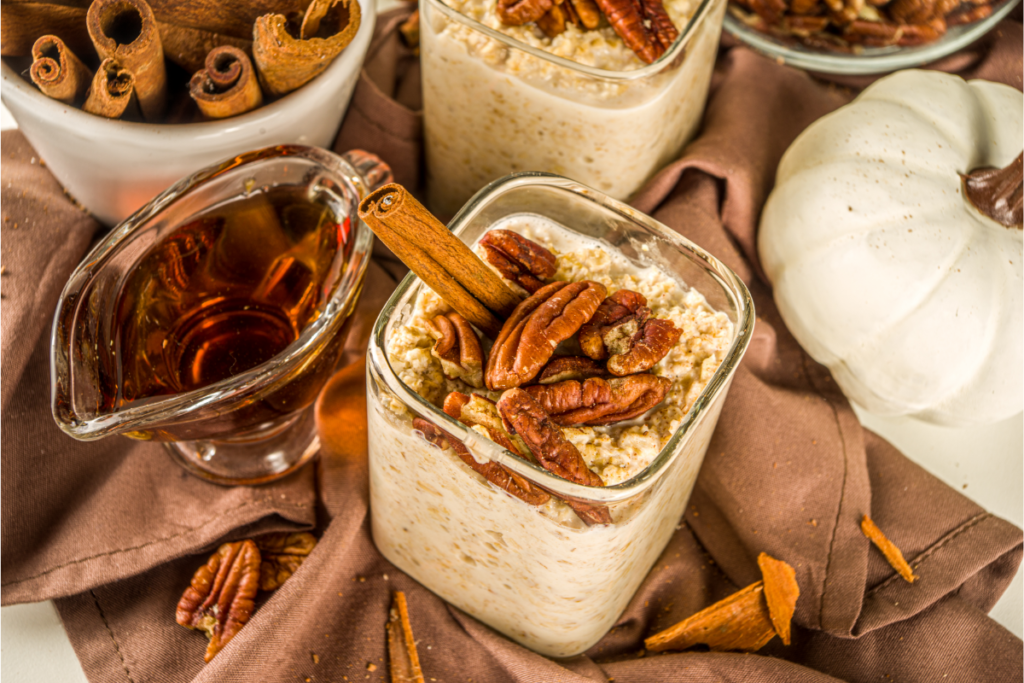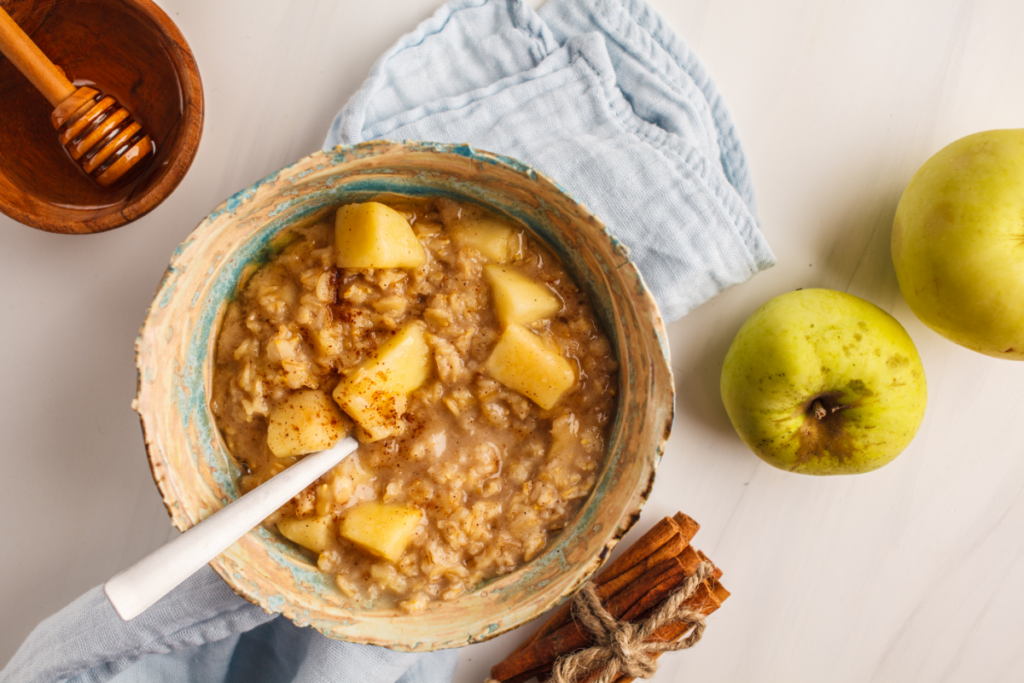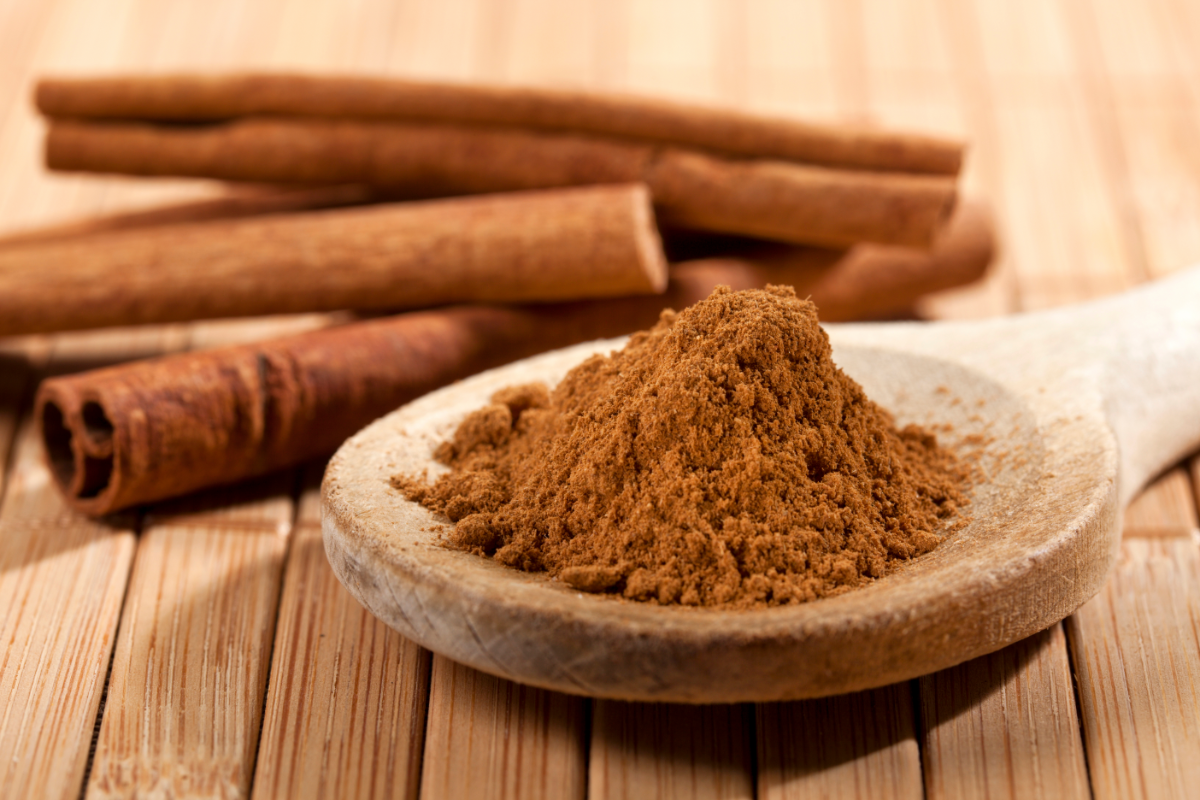Does cinnamon help with weight loss? The question has been around for a long time and is intriguing. Cinnamon, the warm, comfortable spice that makes oatmeal sing and cinnamon buns appealing, may contain more than simply taste.
Okay, so cinnamon doesn’t magically melt away excess pounds. But there’s excitement about how it may promote weight reduction. Please join me in discussing this spice that’s been a culinary staple for years.
Cinnamon may conjure images of hot cider or sticky buns, but it may also help you lose weight. Some people wonder whether this tasty spice might help them lose weight. Understanding cinnamon’s limitations and creating reasonable expectations is key.
If reducing weight were as easy as eating cinnamon sticks, we’d all do it, right? Let’s study cinnamon’s benefits beyond its allure and reminiscence.
Understanding Cinnamon’s Composition
Before we dive into how cinnamon can potentially help with weight loss, let’s first understand what makes this spice unique. Cinnamon comes from the bark of Cinnamomum plants and includes bioactive chemicals with health benefits.
- Cinnamon’s taste and aroma come from its principal active component, cinnamonaldehyde.
- Cinnamic acid is a polyphenol that may have anti-inflammatory properties.
- Cinnamate has antioxidant and antimicrobial effects.
While the exact composition of cinnamon can vary depending on the type and source, these bioactive compounds make cinnamon stand out as a potentially beneficial spice for overall health and wellness.
🤎The Role of Cinnamon in Metabolism and Blood Sugar Regulation
Regarding weight loss, cinnamon’s impact on metabolism and blood sugar levels may be one of its key benefits. Research suggests that cinnamon can improve insulin sensitivity, which means it helps the body regulate blood sugar levels more effectively. Cinnamon may promote weight reduction by reducing blood sugar spikes that cause appetite and overeating.
Additionally, cinnamon may also have a positive impact on metabolism. In certain studies, cinnamon increases metabolic rate, meaning the body burns more calories at rest.
- One study found that cinnamon increased post-meal metabolism by up to 20% in participants with metabolic syndrome.
- Another study found that cinnamon extract increased fat oxidation, meaning it helped the body burn fat for energy instead of storing it.
While more research is needed to fully understand the relationship between cinnamon and metabolism, these findings indicate that cinnamon may be a useful tool for weight management.
Impact on Appetite and Cravings
As someone who has struggled with overeating and food cravings, I was particularly interested in learning more about how cinnamon could help with appetite control. Research suggests that cinnamon may have a positive impact on both hunger levels and cravings.
💯Reduced Appetite
A study found that participants who consumed a cinnamon supplement experienced decreased hunger and increased satiety. Another study showed that adding cinnamon to a high-carb meal reduced post-meal blood sugar spikes and increased feelings of fullness.
💯Craving Control
Cravings can be a major roadblock when trying to lose weight. However, cinnamon may offer some support in this area as well. A study conducted on women with Polycystic Ovary Syndrome (PCOS) found that consuming cinnamon supplements helped reduce cravings for sweet foods.
While more research is needed to fully understand how cinnamon impacts appetite and cravings, these initial findings are promising. Incorporating cinnamon into your diet may help you feel fuller for longer and reduce the likelihood of reaching for unhealthy snacks.
Cinnamon’s Effect on Fat Burning

Many individuals want to strengthen their metabolism and fat-burning skills to lose weight. Cinnamon may help, but not magically.
👉🏻The Thermogenic Effect of Cinnamon
One way cinnamon may enhance fat burning is through its thermogenic effect. Thermogenesis refers to the body’s ability to produce heat and increase calorie expenditure. Cinnamon contains compounds that may slightly increase thermogenesis, causing the body to burn more calories.
While the impact may be minor, incorporating cinnamon into a well-rounded, healthy lifestyle could potentially support weight loss efforts.
👉🏻Incorporating Cinnamon into Your Diet
If you’re interested in trying cinnamon to support fat burning, there are various ways to incorporate it into your diet. Adding cinnamon to smoothies, baked goods, and cereal is simple and tasty.
Alternatively, choosing a reliable brand and following the dose is vital for cinnamon supplements. Remember that cinnamon should be considered a complementary component of a healthy lifestyle, not a standalone solution.
Cinnamon and Digestion
Good digestion and a healthy gut are key to effective weight management. It is where cinnamon comes in handy! Certain compounds present in cinnamon, such as cinnamic acid, could support digestive health by reducing inflammation and promoting a balanced gut microbiome, which in turn may help with weight loss.
Moreover, studies reveal that cinnamon may stimulate digestion and reduce constipation. Cinnamon could even help alleviate stomach cramps and bloating in some cases.
I love adding cinnamon to warm herbal tea. It soothes my tummy, making it a comfortable winter treat.
✔Other ways to eat cinnamon for intestinal health:
- Adding cinnamon to your oatmeal or overnight oats in the morning
- Coffee or hot chocolate with a pinch of cinnamon
- Mixing cinnamon into your smoothie or protein shake
- Sprinkling cinnamon on top of roasted vegetables like sweet potatoes or butternut squash
Remember to be mindful of how much cinnamon you consume. While it is generally safe, too much of anything can have adverse effects. Excessive consumption of cinnamon could lead to liver damage, so keep your intake moderate.
Combining Cinnamon with Other Healthy Habits

As with any weight loss strategy, cinnamon should not be a magic solution. Incorporating it into a well-rounded, healthy lifestyle can enhance its effects and boost your weight management efforts.
💪🏻Exercise Regularly
Regular exercise is critical for weight management, as it helps burn calories and increase metabolism. Pairing cinnamon with a workout routine can potentially enhance its benefits, as cinnamon may aid in fat-burning and energy expenditure.
Try incorporating cinnamon into a pre-workout snack, such as a smoothie or energy bite, or sprinkle it on top of your post-workout oatmeal or yogurt.
🥗Eat a Balanced Diet
Healthy weight requires a varied, nutrient-dense diet. Pairing cinnamon with foods high in fiber and protein can help balance blood sugar levels and reduce appetite.
Try adding cinnamon to your morning oatmeal or yogurt bowl, or sprinkle it on top of roasted sweet potatoes or veggies for a sweet and savory twist.
🥤Stay Hydrated
Health and weight control depend on proper hydration. Water aids digestion, flushes toxins, and reduces cravings.
Try infusing water with cinnamon sticks for a flavorful and refreshing twist. Add a dash of cinnamon to your herbal tea or warm lemon water for added benefits.
Cautions and Considerations
It’s important to note that while cinnamon is generally safe for consumption, it’s essential to exercise caution and awareness. Some people may be allergic or sensitive to cinnamon, so it’s wise to start with small amounts and monitor for adverse reactions. Large doses of cinnamon, especially cinnamon oil, might harm the liver or lungs.
For cinnamon supplements, find a trustworthy brand and follow the dose. Excess cinnamon may cause skin irritation and stomach difficulties.
While cinnamon may offer some weight loss benefits, it’s essential to remember that it should not replace medical advice or be seen as a cure-all for weight management. Consulting with a healthcare professional is vital, particularly if you have any underlying health concerns or are taking medication.
Ways to Incorporate Cinnamon into Your Diet

Cinnamon may boost weight reduction in an easy and tasty method. Here are a few ideas for incorporating cinnamon into your daily routine:
➡Sprinkle on Oatmeal or Yogurt
Sprinkle cinnamon over oatmeal or yogurt for a quick breakfast. It adds taste and keeps you full of fiber and protein.
➡Incorporate into Smoothies
Adding cinnamon to your favorite smoothie recipe can give it a warm, cozy flavor. Consider combining it with banana, almond milk, and vanilla protein powder for a satisfying and nutritious meal replacement option.
➡Bake with Cinnamon
Cinnamon is a common ingredient in many baked goods, including muffins, bread, and cookies. Make meals using cinnamon as the main ingredient, or just sprinkle some cinnamon on top of your favorite foods to give them a little additional taste.
➡Try Cinnamon Supplements
If you’re not a fan of the taste of cinnamon or struggle to incorporate it into your diet regularly, cinnamon supplements might be an option worth exploring. Look for a reputable brand and follow the recommended dosage.
➡Get Creative with Cinnamon Recipes
There are countless ways to use cinnamon in your cooking and baking. From cinnamon-spiced sweet potatoes to cinnamon apple chips, the possibilities are endless. Experiment with different recipes to find what works best for you.
Incorporating cinnamon into your diet can be enjoyable and potentially beneficial for weight loss. Whether you sprinkle it on oatmeal or get creative with cinnamon recipes, give this flavorful spice a try and see how it can supplement your weight loss journey.
The Need for Further Research
While cinnamon has shown some promise in contributing to weight loss efforts, there is still much to learn about its effects and potential benefits. Further research is needed to understand the relationship between cinnamon and weight loss, including long-term effects and optimal dosages.
Future studies should also consider potential interactions with other medications or health conditions, as well as the various forms in which cinnamon is consumed (spice, supplement, etc.).
Given the limited research available, it’s important to approach cinnamon as a supplement to a well-rounded, healthy lifestyle rather than a magic solution for weight loss. As researchers conduct more studies, we may gain a better understanding of cinnamon’s potential benefits and how to best incorporate it into our diets.
Frequently Asked Questions
Q: Can cinnamon help in controlling appetite?
A: Cinnamon has a potential role in controlling appetite and managing blood sugar levels. Some research suggests that compounds in cinnamon, such as cinnamaldehyde, can affect metabolism and blood glucose regulation, which in turn may influence appetite control. By slowing down the pace at which food leaves the stomach, cinnamon may help people feel fuller for longer and be less likely to overeat.
Additionally, by helping to moderate blood sugar levels, it may prevent the spikes and crashes that often lead to increased hunger and cravings. Even if these results are encouraging, a balanced diet and a healthy lifestyle are still necessary.
Q: How much cinnamon is safe to consume daily?
A: The kind of cinnamon and the person determine the daily safe dosage. Cassia and Ceylon cinnamon are the primary kinds. Cassia cinnamon, often available in supermarkets, has more coumarin, which may be dangerous in large amounts. Typical adults should consume 1 teaspoon of Cassia cinnamon per day, which is 0.1 milligrams of coumarin per kilogram of body weight, according to the European Food Safety Authority.
Ceylon cinnamon, on the other hand, contains much lower levels of coumarin and is considered safer in higher amounts. However, as with any supplement or dietary addition, it’s important to err on the side of caution. Generally, up to 1 teaspoon of Ceylon cinnamon daily is safe for most people. If you have any health conditions, particularly those related to the liver or blood clotting, or if you’re pregnant or breastfeeding, it’s best to consult a healthcare professional before adding significant amounts of cinnamon to your diet.
Q: Can cinnamon cause any allergic reactions?
A: Yes, like many foods and spices, cinnamon may induce allergic responses, although they are uncommon. Allergic reactions to cinnamon can range from mild to severe. They may include symptoms like oral irritation, swelling of the gums and mouth, dermatitis, hives, or even more severe symptoms like difficulty breathing or anaphylaxis in rare instances.
There’s also a condition known as cinnamon-induced contact stomatitis, which can cause inflammation inside the mouth due to an allergic reaction. It’s important to note that some reactions might not be due to the cinnamon itself but to other compounds mixed within certain preparations. People with known allergies or those who experience adverse reactions upon consuming cinnamon should avoid it and consult with a healthcare provider.
Q: How should cinnamon be stored for maximum freshness?
A: Store cinnamon in a cool, dark, and dry place to ensure its maximum freshness and preserve its flavor and potency. The kitchen cabinet away from heat sources like the stove or oven is an ideal spot. Store cinnamon in an airtight container to avoid moisture and air damage, and stale flavor.
If you have cinnamon sticks, you might grind only a small amount at a time to maintain its freshness. Ground cinnamon tends to lose its potency faster than cinnamon sticks, but when stored properly, both forms can last for several years—through the best flavor is usually enjoyed within the first year. If you live in a particularly warm or humid environment, storing cinnamon in the refrigerator or freezer in a tightly sealed container can further extend its shelf life. Before opening the container, let it reach room temperature to avoid condensation.
Q: Is organic cinnamon better than non-organic cinnamon?
A: The choice between organic and non-organic cinnamon often comes down to personal preference and priorities regarding agricultural practices. Organic cinnamon meets organic cultivation standards by not using synthetic herbicides, pesticides, or fertilizers. It can be an important factor for those looking to minimize their exposure to synthetic chemicals and support farming methods often seen as more environmentally friendly. Some people also claim that organic cinnamon offers a superior flavor and quality, although this can be subjective.
On the other hand, non-organic cinnamon is typically less expensive and still undergoes safety checks to ensure that any pesticide residues are within the limits deemed safe for consumption. Nutritionally, there is generally little difference between organic and non-organic cinnamon. Ultimately, whether organic cinnamon is “better” may depend on your values and concerns about health, taste, environmental impact, and cost.
Conclusion
While cinnamon may not be a miracle solution for weight loss, it certainly offers potential benefits. Cinnamon’s properties, such as its impact on metabolism, appetite suppression, and fat-burning potential, may aid in weight management. However, cinnamon should not substitute a balanced diet, moderate exercise, or medical guidance.
Incorporating cinnamon into your daily routine, whether sprinkling it on food or taking supplements, can be an easy and delicious way to potentially support your weight loss efforts. Start with tiny dosages and watch for side effects like any supplement.
While more research is needed to fully understand the relationship between cinnamon and weight loss, trying it out as a complementary component of your healthy lifestyle may provide additional support and help you achieve your desired results. So, spice up your life with cinnamon and see if it works!

